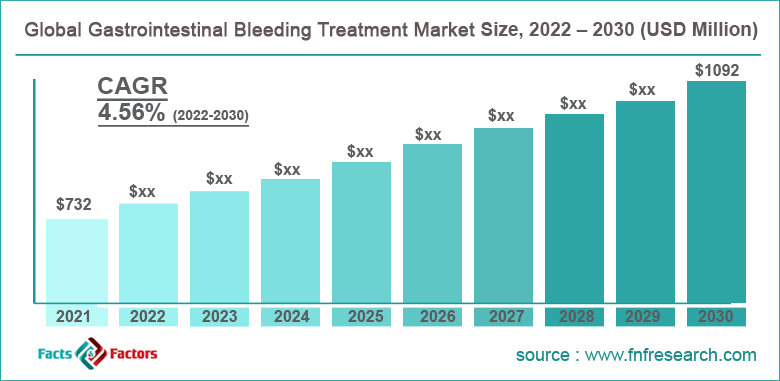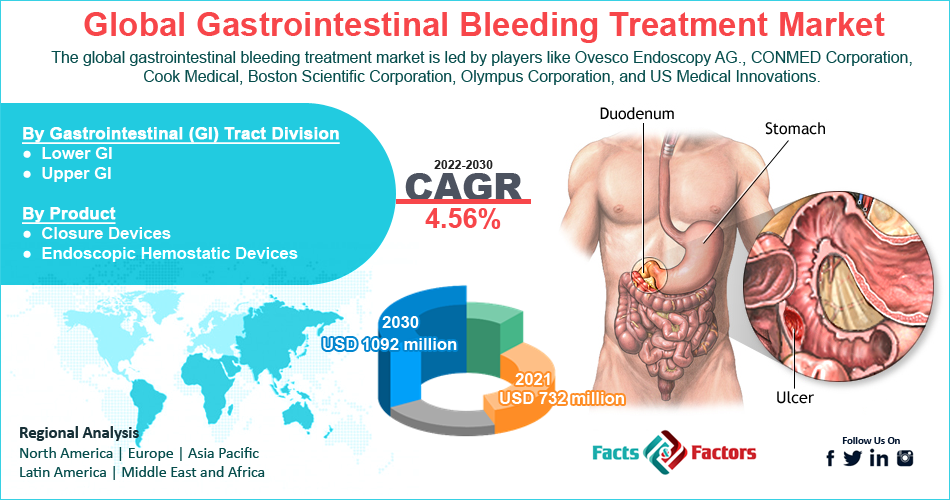Search Market Research Report
Gastrointestinal Bleeding Treatment Market Size, Share Global Analysis Report, 2022 – 2030

Gastrointestinal Bleeding Treatment Market Size, Share, Growth Analysis Report By Gastrointestinal (GI) Tract Division (Lower GI and Upper GI), By Product (Closure Devices and Endoscopic Hemostatic Devices), and By Region - Global and Regional Industry Insights, Overview, Comprehensive Analysis, Trends, Statistical Research, Market Intelligence, Historical Data and Forecast 2022 – 2030
Industry Insights
[211+ Pages Report] According to the report published by Facts Factors, the global gastrointestinal bleeding treatment market size was worth around USD 732 million in 2021 and is predicted to grow to around USD 1092 million by 2030 with a compound annual growth rate (CAGR) of roughly 4.56% between 2022 and 2030. The report analyzes the global gastrointestinal bleeding treatment market drivers, restraints/challenges, and the effect they have on the demands during the projection period. In addition, the report explores emerging opportunities in the gastrointestinal bleeding treatment market.

 Market Overview
Market Overview
Gastrointestinal bleeding is a symptom associated with digestive tract disorder. The blood, as a consequence of the condition, generally appears in vomit or stool but it may not be visible when appearing with the latter as the stool color may change to tarry or black. The blood flow intensity can vary from mild to severe and in certain cases, it is life-threatening. To effectively locate the bleeding cause, sophisticated imaging tools are required and the treatment will depend on the bleeding source. The signs of the condition can either be hidden or obvious and they are dependent on the exact location the bleeding is occurring from.
Obvious bleeding is called overt bleeding and it may show up as vomit blood that is generally dark brown or red. It may also be as black or tarry stool or in the form of rectal bleeding. In the case of hidden bleeding, called occult bleeding, the associated symptoms include chest pain, difficulty in breathing, lightheadedness, fainting, and abdominal pain. A patient suffering from gastrointestinal (GI) bleeding may go into shock if the bleeding starts suddenly or the rate of flow increases abruptly. There are certain symptoms that are related to shock and include rapid pulse, drop in blood pressure, and unconsciousness amongst others.
 Key Insights
Key Insights
- As per the analysis shared by our research analyst, the global gastrointestinal bleeding treatment market is estimated to grow annually at a CAGR of around 4.56% over the forecast period (2022-2030)
- In terms of revenue, the global gastrointestinal bleeding treatment market size was valued at around USD 732 million in 2021 and is projected to reach USD 1092 million, by 2030.
- The market is projected to grow at a significant rate due to the growing population suffering from GI bleeding-inducing diseases
- Based on gastrointestinal (GI) tract division segmentation, upper GI was predicted to show maximum market share in the year 2021
- Based on product segmentation, endoscopic hemostatic devices were the leading product in 2021
- On the basis of region, North America was the leading revenue generator in 2021

 Growth Drivers
Growth Drivers
- Growing population suffering from GI bleeding-inducing diseases to propel market demand
The global gastrointestinal bleeding treatment market is projected to grow owing to the increasing number of patients who are suffering from diseases that can cause GI bleeding. GI is not a disease in itself but one of the symptoms associated with several diseases. Some of them include ulcerative colitis, peptic ulcers, hemorrhoids, inflammation of the esophagus, colon, stomach, or esophagus cancer, and Crohn’s disease. As the cause of GI bleeding can be any of the mentioned diseases, the number of patients with the issue remains consistently high.
Crohn’s disease remains one of the leading causes of gastrointestinal bleeding. It is an inflammatory bowel disease (IBD) that leads to swelling of the digestive tract tissue. It can cause weight loss leading up to malnutrition or severe abdominal pain. In certain situations, Crohn’s disease can be life-threatening. Currently, there is no cure for the disease but therapies can help patients manage the condition and symptoms. With enough and effective treatment, many patients have reported being functional well. As per official data, upper GI bleeding is observed in almost 50 to 150 out of 100,00 adults annually. More than 100,000 people in the US reportedly visit hospitals to get GI bleeding treatment.
 Restraints
Restraints
- Uncertainty related to the cause of the disease to impede market expansion
There is no one particular reason for GI bleeding to start. It can due to several factors which make the detection of the symptom extremely difficult in the medical community. Doctors and healthcare professionals have to invest in highly advanced imaging techniques to understand the main reason for the bleeding to occur which results in delayed treatment. Without the right information, doctors are unable to provide an accurate and timely cure.
 Opportunities
Opportunities
- Increasing cases of stomach cancer to cause further growth
One of the most common symptoms of a stomach or gastric cancer is gastrointestinal bleeding. In the majority of the cases, occult bleeding is more common as compared to overt bleeding which is observed in less than 20% of the cases. Stomach cancer occurs due to the cells that originate in the stomach. Gastric cancer may not necessarily show any initial symptoms but patients in the later stages of cancer are known to suffer from extreme weight loss, tiredness, black stools, and vomiting blood. Studies have indicated that over 7 in 100,000 people get diagnosed with stomach cancer and 0.8% of men & women may be diagnosed with the disease at some point in life.
 Challenges
Challenges
- Clearing of the blood clot and blood remains a challenge in the market
The biggest challenge that remains during the medical procedures involving the operation related to upper GI bleeding is the proper clearing of blood clots and blood to help the medical professionals clearly visualize the bleeding site. Gastric lavage is the most widely used method but it is an extremely lengthy process and sometimes it may not remove the gastric content completely.
 Segmentation Analysis
Segmentation Analysis
The global gastrointestinal bleeding treatment market is segmented based on gastrointestinal (GI) tract division, product, and region
Based on the gastrointestinal (GI) tract division, the global market segments are lower GI and upper GI with the latter leading the segmental growth in 2021 due to the high prevalence of the condition. One of the major reasons for upper GI tract bleeding is peptic ulcer. These are sores that originate in the inner lining of the stomach along with the upper portion of the small intestine. The sores can be caused due to stomach lining getting damaged because of stomach acid, consumption of anti-inflammatory drugs, or bacteria. The chances of a person suffering from upper GI bleeding is 70% whereas the risk percentage for lower GI bleeding is around 30%.
Based on product, the global market divisions are closure devices and endoscopic hemostatic devices with the latter leading the global market growth in the previous year and the same trend projected for the coming years. Endoscopic hemostatic is one of the most common methods of treating gastrointestinal bleeding. The procedure is critical for managing GI hemorrhage and for preventing GI bleeding during highly risky endoscopic processes. A recent study concluded the success rate of endoscopic treatment for treating peptic ulcers was around 94%.
 Recent Developments:
Recent Developments:
- In January 2021, Hitachi Ltd and Olympus Corporation entered a joint collaboration. Olympus Corporation is a Japan-based provider of effective solutions for GI bleeding. The collaboration will last for 5 years and will be directed toward the development of Endoscopic Ultrasound Systems (EUS)
- In August 2022, Boston Scientific Corporation acquired Obsidio, Inc, the company responsible for developing Gel Embolic Material technology
 Report Scope
Report Scope
Report Attribute |
Details |
Market Size in 2021 |
USD 732 Million |
Projected Market Size in 2030 |
USD 1,092 Million |
CAGR Growth Rate |
4.56% CAGR |
Base Year |
2021 |
Forecast Years |
2022-2030 |
Key Market Players |
Ovesco Endoscopy AG., CONMED Corporation, Cook Medical, Boston Scientific Corporation, Olympus Corporation, US Medical Innovations, and others. |
Key Segment |
By Gastrointestinal (GI) Tract Division, Product, and Region |
Major Regions Covered |
North America, Europe, Asia Pacific, Latin America, and the Middle East &, Africa |
Purchase Options |
Request customized purchase options to meet your research needs. Explore purchase options |
 Regional Analysis
Regional Analysis
- North America to register the highest growth
The global gastrointestinal bleeding treatment market is projected to register the highest growth in North America due to the highly advanced medical infrastructure of the US and Canada. The regional growth is likely to witness surging growth due to the rise in approvals by the US Food and Drugs Administration (FDA) authority. In 2018, the agency approved the use of a Hemospray device which is meant to treat GI bleeding conditions. The device is capable of stopping the bleeding without the use of any mechanical, thermal, or contact method that is known to cause complications if not done correctly.
Hemospray is a single-use device and it works by spraying inorganic power on the bleeding site which becomes an advantageous factor because it eliminates the need to visualize the site. Growth in Asia-Pacific may be driven by the increase in research & development of new treatment methods for GI bleeding-inducing medical diseases.
 Competitive Analysis
Competitive Analysis
- Ovesco Endoscopy AG.
- CONMED Corporation
- Cook Medical
- Boston Scientific Corporation
- Olympus Corporation
- US Medical Innovations
The global gastrointestinal bleeding treatment market is segmented as follows:
 By Gastrointestinal (GI) Tract Division Segment Analysis
By Gastrointestinal (GI) Tract Division Segment Analysis
- Lower GI
- Upper GI
 By Product Segment Analysis
By Product Segment Analysis
- Closure Devices
- Endoscopic Hemostatic Devices
 By Regional Segment Analysis
By Regional Segment Analysis
- North America
- The U.S.
- Canada
- Mexico
- Europe
- France
- The UK
- Spain
- Germany
- Italy
- Nordic Countries
- Denmark
- Sweden
- Norway
- Benelux Union
- Belgium
- The Netherlands
- Luxembourg
- Rest of Europe
- Asia Pacific
- China
- Japan
- India
- Australia
- South Korea
- Southeast Asia
- Indonesia
- Thailand
- Malaysia
- Singapore
- Rest of Southeast Asia
- Rest of Asia Pacific
- The Middle East & Africa
- Saudi Arabia
- UAE
- Egypt
- South Africa
- Rest of the Middle East & Africa
- Latin America
- Brazil
- Argentina
- Rest of Latin America
Industry Major Market Players
- Ovesco Endoscopy AG.
- CONMED Corporation
- Cook Medical
- Boston Scientific Corporation
- Olympus Corporation
- US Medical Innovations
Frequently Asked Questions

Copyright © 2025 - 2026, All Rights Reserved, Facts and Factors


